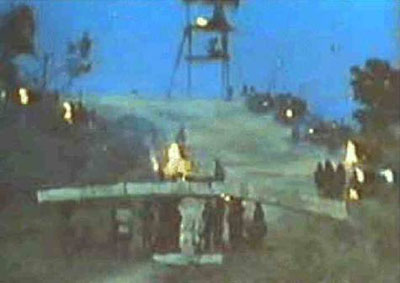 |
The movement of troops through the islands of the South Pacific in World War II had a profound, unintended consequence for the native cultures living in them. These isolated aboriginal peoples were suddenly exposed to soldiers in the Japanese and Allied Forces, who brought incredible amounts of manufactured clothing, medicine, canned foods, tents, weapons, and other goods with them. These supplies, some of which were shared with the islanders, were even dropped miraculously from the sky.
Then the war was over, the airbases were quickly abandoned, and the wonderful cargo stopped falling from the heavens. The islanders, in an attempt to persuade their gods and ancestors to bring more cargo to them in planes, ships, and parachutes, began ritualistically imitating the behaviors of the soldiers. They waved landing signals while standing on the abandoned runways, now lit with torches. They carved wooden headphones and sat in replicas of control towers, all in an attempt to bring the wonderful riches from beyond.
From our technologically-advanced perspective, we may fall into the trap of looking down on these “Cargo Cults,” as they are known, but a bit of introspection finds that we may all be guilty of such magical thinking. In my own profession, we have the term cargo cult programming, where a novice programmer includes code that serves no purpose in their software simply because they don’t understand what it does. I know that I have been guilty of such a logical fallacy in my own coding as a novice, where I would incorporate a large block of another programmer’s code into my work because I lacked the skills to identify the smaller portion of it that I actually needed. I didn’t know how the code worked; I just knew that copying and pasting it into my software solved my problems.
Richard Feynman coined the term “Cargo Cult Science” in his 1974 commencement address at Caltech to describe scientific ideas that we accept because they are established dogma rather than because they provide evidentiary proof of their effectiveness:
There are big schools of reading methods and mathematics methods, and so forth, but if you notice, you’ll see the reading scores keep going down–or hardly going up in spite of the fact that we continually use these same people to improve the methods. There’s a witch doctor remedy that doesn’t work. It ought to be looked into; how do they know that their method should work? Another example is how to treat criminals. We obviously have made no progress–lots of theory, but no progress–in decreasing the amount of crime by the method that we use to handle criminals.
Yet the true essence of science is to perpetually challenge the dominant paradigm. Someone once told me they didn’t trust science because it was, “One guy saying he saw something and some other guy agreeing with him;” but this is the very antithesis of the scientific process.
Science doesn’t say “This is what I saw, worship me!” Science says, “This is what I saw, this is how I saw it, now go see for yourself.” The whole purpose of peer-review is to have others try and replicate your experiments, and if they don’t get the same results? Well, isn’t that interesting?
Feynman has a word of warning to scientists who will compromise scientific truth for personal gain:
We’ve learned from experience that the truth will come out. Other experimenters will repeat your experiment and find out whether you were wrong or right. Nature’s phenomena will agree or they’ll disagree with your theory. And, although you may gain some temporary fame and excitement, you will not gain a good reputation as a scientist if you haven’t tried to be very careful in this kind of work. And it’s this type of integrity, this kind of care not to fool yourself, that is missing to a large extent in much of the research in cargo cult science.
The cargo cults of the south pacific mostly vanished when their newfound rituals failed to procure the favor of the gods, but one of these religions, the John Frum Cult, still exists today, and the inhabitants of Tanna island in Vanuatu still hold a parade every year, waiting for their god to return. In the meantime, the cult believes it has some empirical evidence validating their faith, as the influx of tourists to the island bring with them some of the legendary riches of the past.
Which societies are better off, the ones who abandoned their magical thinking, or the ones still living the illusion?
Comments
14 responses to “Putting Away Magical Thinking”